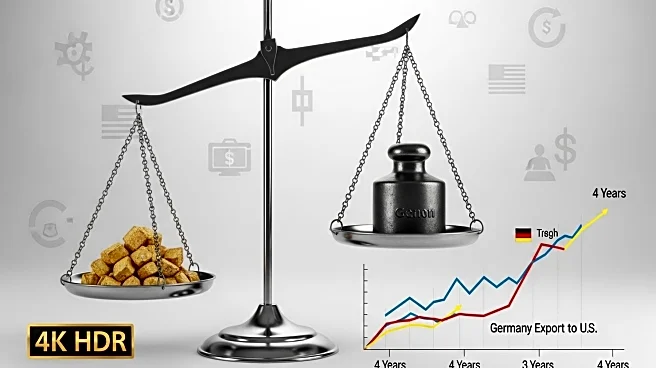What is the story about?
What's Happening?
German exports to the United States have reached their lowest level since 2021, as President Trump's tariffs continue to impact Europe's largest economy. According to data from the federal statistics agency Destatis, exports of German goods to the US fell by 7.9 percent in July compared to the previous month, marking the fourth consecutive monthly decline. The total value of these exports dropped to 11.1 billion euros, despite the US remaining the top destination for German products. The tariffs have exacerbated existing challenges for German manufacturers, including high energy costs, competition from Asia, and weak demand. Overall, Germany's exports contracted by 0.6 percent in July, contrary to analysts' expectations of zero growth. However, industrial production in Germany showed signs of recovery, growing by 1.3 percent in July, driven by sectors such as factory equipment, automotive, and pharmaceuticals.
Why It's Important?
The decline in German exports to the US highlights the significant impact of President Trump's trade policies on international trade dynamics. Germany, known for its export-driven economy, faces increased pressure as tariffs disrupt its access to one of its largest markets. This situation underscores the broader implications of trade tensions between major economies, potentially affecting global supply chains and economic stability. German manufacturers, already grappling with high operational costs and competitive pressures, may experience further financial strain, leading to potential job losses and reduced economic growth. The rebound in industrial production offers a glimmer of hope, suggesting that certain sectors may recover despite the challenging trade environment.
What's Next?
As Germany navigates the effects of tariffs, stakeholders may seek diplomatic solutions to ease trade tensions with the US. German businesses might explore alternative markets to mitigate the impact of reduced exports to the US. Additionally, policymakers could implement measures to support affected industries, such as subsidies or incentives to boost domestic production. The ongoing trade dynamics may prompt discussions at international forums, aiming to address and resolve trade disputes. Observers will closely monitor Germany's economic performance and industrial output in the coming months to assess the long-term effects of the tariffs.
Beyond the Headlines
The situation raises questions about the ethical and strategic dimensions of trade policies, particularly their impact on global economic cooperation. The tariffs may lead to shifts in international alliances and trade agreements, as countries reassess their economic dependencies and seek more stable partnerships. The long-term implications could include changes in manufacturing strategies, with businesses investing in automation and innovation to remain competitive amid fluctuating trade conditions.















